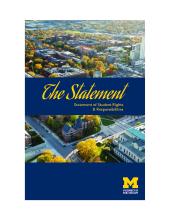The Statement of Student Rights and Responsibilities is a community-owned document that sets forth the University’s values and expectations for resolving conflicts and is intended to maintain a campus climate that supports learning for all students. Similar to policies articulating standards for academic behavior within the University’s schools and colleges, the Statement sets forth the expectations for non-academic behavior for all undergraduate and graduate students at the University of Michigan – Ann Arbor.
The Office of Student Conflict Resolution provides a variety of programs and services designed to support a safe, just and peaceful community, and to help Michigan students learn how to manage and resolve conflict peacefully. To begin a request for conflict resolution services, please complete our Request for Services form. The following links provide information on various kinds of conflicts OSCR can assist you with, including but not limited to roommate disputes, landlord-tenant conflicts, tensions within or between student organizations, and faculty/staff conflicts involving a student.
Healthy Relationships through Communication
Relationships come in many different types. Without effective communication, the relationship can break down and eventually fall apart. In this article, I am going to share a few tips on how to effectively communicate in a relationship to ensure it lasts.
Faculty/Staff and Student Conflicts
OSCR offers services that may be useful for some conflicts between students and faculty/staff members. A one-on-one conflict coaching or consultation session between you and an OSCR staff member may be helpful in exploring various approaches to a particular conflict. Other resources for conflicts with faculty members are Academic Deans or Department Chairs in the faculty member’s academic unit, the Ombud’s office, and the Office of Institutional Equity.
Advisors
Students may have an advisor with them during any Statement proceedings. OSCR staff members can assist stduent in findind an advisor. Advisors can support and advise the student they are advising; help individuals understand the resolution process and available options; and assist individuals in preparing for meetings, taking notes, framing questions, identifying witnesses, and gathering supporting materials


